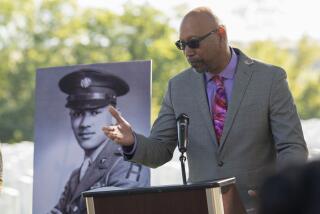Louis Van Iersel, 93, Immigrant Hero of WWI
- Share via
Louis Van Iersel, believed to have been the most highly decorated surviving veteran of World War I who then risked his life for his adopted homeland a second time when he volunteered for the Marine Corps in World War II, is dead at age 93.
Van Iersel, believed to be the first non-citizen ever awarded the nation’s highest military honor, the Medal of Honor, also was the recipient of 14 other American and French decorations for heroism during the first world war. Twenty-four years later he served with the 3rd Marine Division on Bougainville during World War II, adding an Asiatic-Pacific ribbon to a Marine tunic unable to accommodate his earlier Army decorations.
Early Hero
Actually, Van Iersel, who died June 9 in the Veterans Administration hospital in Roseburg, Ore., became a celebrated hero before ever setting foot on U.S. soil.
Born in the Netherlands, Van Iersel was aboard a Norwegian ship bound for the United States in February, 1917, when he rigged the boatswain’s chair that lifted to safety 27 British sailors whose ship had been torpedoed by a German vessel.
He was given a medal for lifesaving at sea in the name of King George V and capped off that voyage by taking out citizenship papers, registering for the draft and enlisting in the Army all on the same day that he landed in the United States.
But serving with American forces had a drawback--he couldn’t speak English.
“They couldn’t drill me until I learned what they were saying,” he told The Times in an interview in 1965, 11 years after he had retired from the Los Angeles City Engineering Department.
He was assigned to kitchen duty because of the language barrier and after four months with his fellow pot and pan scrubbers had become proficient enough in English to be promoted to corporal and be as signed to the 2nd Infantry Division serving in France.
There he received the first of his two Croix de Guerres after he and a comrade braved German gunfire to carry 17 wounded soldiers to safety. The second of his two top French honors came after he had been promoted to sergeant and led a small reconnaissance patrol in the capture of 60 soldiers.
He was able to get into the German trenches because he was fluent in the language and, once over the top, persuaded the officer in charge to surrender his men.
Van Iersel said he probably wouldn’t have attempted the feat if he had known how badly he and his handful of men were outnumbered.
He received the Medal of Honor from Gen. John Pershing for swimming across an icy Seine River under heavy fire and eavesdropping on the enemy. He learned that they had “an artillery barrage all set to wipe out our battalion. . . . “
He eased back into the river and reported his findings. His company then moved into trenches as the German barrage began at Mouzon Bridge.
Saved 1,000 Lives
He was credited with saving the lives of 1,000 men.
After World War I he became a citizen, married and went to work for the city. But when World War II broke out he and his three sons, who survive him along with eight grandchildren, 17 great-grandchildren and one great-great grandchild, volunteered for service.
He was turned down by the Army because of his age but talked his way into the Marine Corps. “They got a lot of publicity out of it,” he remembered after showing up for induction wearing his World War I Army uniform and his dozens of medals.
He returned in 1945 after duty in the South Pacific and lived in Sierra Madre before his health forced him to move nearer a son in Oregon.
Funeral services are pending at Arlington National Cemetery in Virginia.
More to Read
Sign up for Essential California
The most important California stories and recommendations in your inbox every morning.
You may occasionally receive promotional content from the Los Angeles Times.













